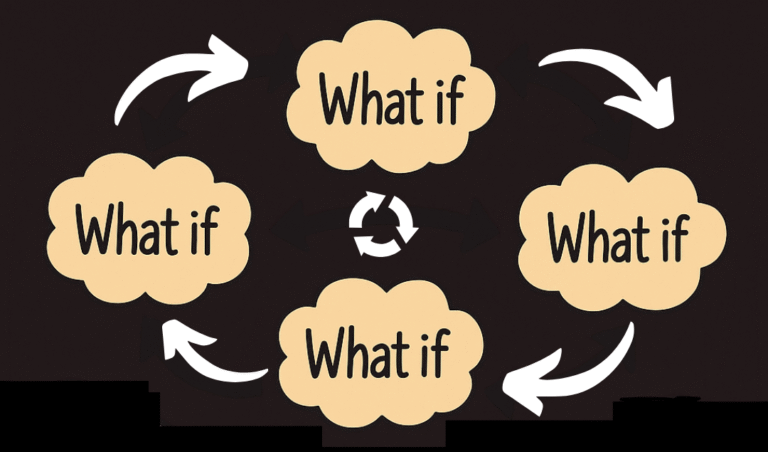What Is Overthinking? A Clear Guide for Exhausted Moms
What is overthinking? You know that moment when you finally lie down, and your brain decides it’s time to replay every decision you made today? Should you have signed up for the extra practice? Did that teacher email sound cold? What if you forgot the field trip form and now your kid will resent you forever? Cool cool, sleep is canceled.
If that sounds familiar, you’re not broken — you’re just stuck in the very human habit of overthinking.
In this post, we’ll unpack what overthinking is, how it sneaks into your daily life, and why it feels like your brain is always buzzing — especially if you’re a mom trying to hold everything together.
When you understand what overthinking is, you can loosen its grip. That means more focus, more energy, and yes, more sleep.
As someone who’s been there (and learned how to get out of the loop), I’m walking you through what’s happening, why it matters, and how to start shifting out of mental overdrive — one thought at a time.
What Is Overthinking, Exactly?
The dictionary definition of overthinking is “to think too much about (something) : to put too much time into thinking about or analyzing (something) in a way that is more harmful than helpful”
It is dwelling on thoughts, worries, or decisions so much that you do not reach a helpful outcome. It feels like thinking, but it does not move you forward. Instead, it loops. You replay conversations. You predict disasters. You pick apart a choice from twelve angles, then feel more confused than when you started.
Helpful reflection asks, what can I learn, then chooses a next step. Overthinking asks, what if, then drags you through worst-case visions. Reflection is a quick check-in. Overthinking is a mental treadmill, you run hard and stay in the same spot.
For moms, it can look like replaying how you handled your child’s meltdown in the store. You keep reliving the moment, searching for the exact sentence you should have said. You end up feeling guilty and no closer to a plan for next time. Or you obsess over a family decision (new daycare or not) until every option feels wrong.
It often feels like a busy mind that will not shut off. You try to pack lunches, yet your thoughts hijack you with a highlight reel of worries. Focus gets fuzzy. Simple tasks take longer. You feel mentally fried by noon.
If you want quick clarity, try this: Does this thinking lead to a clear step, or just more doubt? If it is the second, you are not reflecting, you are overthinking. Keep reading for common signs of overthinking and how to spot them in real time.
Key Signs You’re Overthinking
- Conversation autopsies: You replay what you said to a teacher, friend, or your partner. You hunt for hidden meaning in their tone. You try to decode one eyebrow raise like it is a spy movie. Anxiety rises and you second-guess your instincts.
- Worst-case planning: One bad day at school becomes : my kid will never catch up. A late pickup becomes: I am a bad mom. Your brain loves the disaster channel. Emotional cost, constant fear and a tight chest that sticks around all day.
- Decision paralysis: Picking dinner, shoes for the recital, or which sunscreen to buy becomes a full research project. You scroll reviews at 11 p.m. and still do not decide. Emotional cost, time drains away and frustration builds.
- Perfection pressure: You set impossible standards for meals, routines, screens, behavior. When reality is messy, you beat yourself up. Emotional cost, shame and burnout, plus zero joy in the moments you worked so hard to create.
- “What if” loops at bedtime: Your brain wakes up when your body lies down. You bargain with sleep while your thoughts sprint. Emotional cost, exhaustion that makes everything feel heavier tomorrow.
How Overthinking Differs from Normal Worry
Normal worry is short-term and useful. You think about a doctor’s visit, write down questions, then move on. It is like a quick rain shower that waters the garden.
Overthinking is a storm that sits over your house. It circles the same clouds, soaks everything, and leaves you drained. It does not fix the forecast, it just floods your energy. Motherhood can amplify this because there are more moving parts, more unknowns, and more pressure to get it right. That combo can turn helpful concern into endless rumination.
Why Overthinking Traps Busy Moms and Women
Let’s name the big ones. The causes of overthinking in women often stack on top of each other.
High stress from juggling family, work, and the ghost job of keeping everyone’s lives on track. You carry dates, snacks, doctor notes, school apps, and passwords. This mental load eats space in your brain, so small worries feel huge. You are always “on,” so your thinking never powers down.
Perfectionism fueled by expectations. Be a patient parent, keep the house decent, pack veggie snacks, build a career, maintain friendships, date your partner, and do self-care. Sure. Easy.
Past experiences. Anxiety, trauma, or growing up in a high-stress home can prime your brain to scan for danger. Your nervous system thinks constant review equals safety. It is trying to protect you, but it overfires.
Emotional labour in relationships. You notice moods, fix conflicts, smooth schedules, remember birthdays. That awareness is a gift, but it can go bad. You start managing everyone’s inner world in your head.
Hormonal shifts and sleep deprivation. PMS, postpartum changes, perimenopause, all can increase sensitivity and worry. Lack of sleep turns the dial up to loud. Suddenly a small hiccup feels like a five-alarm event.
Common Triggers in Daily Life
- Uncertainty in parenting: No clear right answer for discipline, school choices, or screen time. Your brain fills the gap with what ifs. Quick self-check, what is one small step I can try this week, not the next 10 years?
- Comparison on social media: Another highlight reel of color-coded lunches and angelic children. Your brain shouts, you are behind. Quick self-check, would I think less of a friend for doing what I did today?
- Unresolved conflict at home: A tense comment from your partner or teen stews in your head. You script replies for hours. Quick self-check, is this a conversation I need to have, or am I rehearsing pain?
- Overloaded schedules: Back-to-back commitments with zero buffer. Every tiny snag becomes a big problem. Quick self-check, what can I drop, delegate, or do at 70 percent today?
The Role of Stress and Exhaustion
Chronic stress turns the brain into a worry amplifier. When you are wiped out, your mental filter gets thin. Thoughts that would normally pass through start sticking. Little concerns echo loud.
Sleep loss makes it worse. Tired brains grab at easy stories, usually the negative ones. Then the cycle starts, worry keeps you up, less sleep makes worry louder. You can spot the pattern early by noticing your tells – snapping at small things, foggy focus, or scrolling longer at night. Call it out, I am in the spiral because I am tired, not because everything is on fire.
The effects of overthinking on the body and First Steps to Ease It
Overthinking is not just annoying, it has real effects on your life. Emotionally, it fuels anxiety, irritability, and low mood. Confidence erodes when you second-guess every move. Relationships get tense, you seem distant or critical because your brain is busy running simulations.
Physically, your body pays. Tight shoulders, headaches, stomach flutters, jaw clenching, insomnia. Your stress system stays activated, so rest feels out of reach. This steals joy from small wins and sweet moments. You are at the park, but in your head you are in next Tuesday.
Here is the hopeful part. Awareness is a power move. You do not have to fix everything today. You can start with simple tips that interrupt the loop.
- Try a micro-pause when you notice a spiral, name it, “This is the worry loop.”
- Use a breath reset, four slow breaths, in through your nose, out longer through your mouth.
- Scribble the top three worries on paper to get them out of your head. Or say it out loud to a trusted friend.
Each small step gives your brain a new path.
Mindfulness can help, not the fancy kind, the three-senses check. What can I see, hear, and feel right now?
Journaling helps too, especially a brain dump at night.
Set a tiny decision deadline, decide dinner in two minutes, then move on.
These are not cures. They are anchors. The more you practice, the faster you catch the spiral and the more energy you get back.
How It Affects Your Well-Being
Mentally, constant doubt chips away at confidence. You stop trusting your gut, so choices feel heavier. Joy shrinks because your brain is busy auditing the past or predicting trouble. Physically, tension piles up, tight neck, headaches, shallow breathing. Over time this feeds burnout. The worst part, it steals sparkle from everyday moments with your family. You are there, but not really there.
Quick Ways to Spot and Pause Overthinking
- Box-breath reset: Breathe in for 4, hold 4, out 4, hold 4. Do it three rounds. Say, “I can think later.” This calms the nervous system so your thoughts quiet down.
- Set a worry window: Give worry a container, 10 minutes after the kids are in bed. Write the fears, pick one tiny action, then close the notebook. If the thought pops up later, tell it, we have a meeting tomorrow.
- Phone-a-friend reality check: Share the actual fear, not the tidy version. Ask, “What is the simplest next step you see?” Let someone who loves you offer perspective your spiral hides.
Example, if you are stuck on school choice, breathe, give yourself a 24-hour decision limit, call a friend, pick one pro and one con, then decide. Good enough is good enough.
What’s next
Overthinking is thinking in overdrive, lots of worry with little payoff.
You are not alone, and you are not failing. Awareness is the first step to lighter days. Try one tiny pause tool today, a breath reset, a worry window, or a quick text to a friend. Then come back and share what shifted. Your brain can learn a calmer path. And you, tired hero, deserve that quiet.







